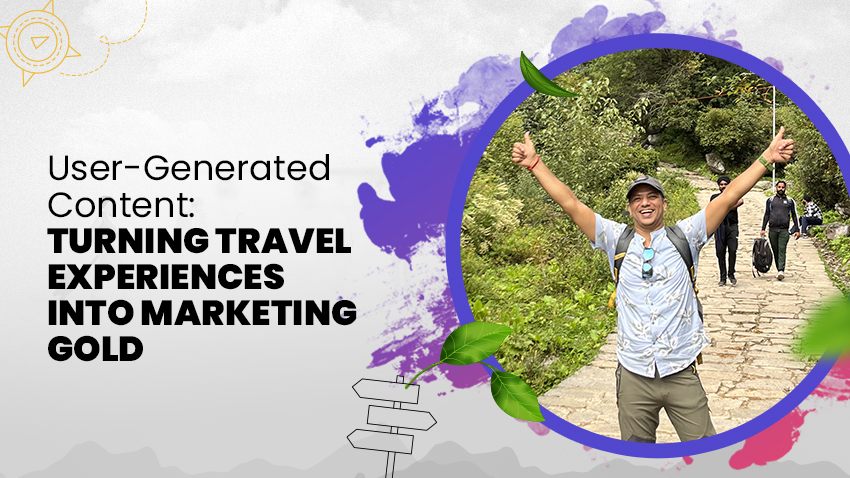User-Generated Content: Turning Travel Experiences into Marketing Gold

In the digital age, where information is at our fingertips, content marketing has emerged as a powerful tool for businesses to connect with their audience. In the realm of travel, this strategy becomes a gateway to inspiring adventures and informative journeys.
As wanderlust continues to captivate the hearts of individuals worldwide, the role of content marketing in the travel industry has become more significant than ever.
Why is travel content marketing Important?
Understanding the significance of a travel content marketing strategy is crucial before delving into specific strategies. In the rapidly changing digital landscape, relying on outdated tactics may hinder success.
Each industry, including travel, requires a tailored approach for relevance. Personalization is pivotal, with 81% of travellers favouring brands offering personalised experiences.
(Source: https://contentmarketing.io/travel-content-marketing/)
Refining content tactics consistently is necessary to keep up with the latest trend. Agencies that offer outreach content marketing offer a practical alternative, even for those with limited internal resources.
Strategic tactics on search engines, social media, and other channels are essential for effective online competition. Let’s now examine the crucial components of content marketing in the travel industry.
1. The Rise of Content Marketing in Travel
The field of content marketing has experienced a significant shift, moving from printed brochures to dynamic web material. Today’s travellers go to a variety of sources for ideas and knowledge rather than just travel firms.
Content marketing has stepped up to the plate, giving travel companies a forum to offer insider knowledge, tell gripping tales, and highlight stunning locations.
2. Storytelling: A Passport to Inspiration
Storytelling is the passport to inspiration in the realm of travel. Travel businesses can take their audience to far-off places by telling captivating stories that arouse their desire.
Stories give travel content a human touch and make it memorable, whether they are firsthand accounts of exhilarating adventures, cultural explorations, or personal transformations.
3. Visual Content: Painting Pictures Worth a Thousand Words
The era of digital media is dominated by visual material. Before ever setting foot on foreign land, travellers may experience a location thanks to breathtaking photos, engrossing videos, and engaging virtual tours. =
Travel-related content marketers need to use images to tell a story that appeals to their target audience and is visually appealing. The options are infinite, ranging from Instagram-worthy photos to drone footage that captures expansive landscapes.
4. SEO Strategies: Navigating the Online Wilderness
Effective Search Engine Optimisation (SEO) is the compass that directs users to pertinent material across the enormous expanse of the internet. To make sure that prospective travellers can find their material, travel firms need to engage in SEO methods.

To make a business stand out among the digital clutter, keyword research, mobile optimisation, and local SEO are essential.
5. Engaging Blogs and Articles: The Roadmaps to Informed Journeys
Articles and blogs serve as the route maps for educated traveller journeys. Well-written content establishes travel businesses as reliable sources of information, whether it’s a thorough travel guide, a listicle of must-see locations, or an informative essay on regional customs and traditions.

Blog postings that are interesting, educational, and optimised for search engines enhance a company’s reputation and offer travellers useful information for organising their next trip.
6. Social Media: Building Communities of Explorers
Social media platforms function as vibrant hubs where travellers may interact, exchange ideas, and look for motivation. Content marketers need to take advantage of social media sites such as Facebook, Instagram, and Twitter to build communities of explorers who share their interests.
Brands may reach a wider audience by utilising interactive marketing, hashtags, and user-generated material. This can help travellers feel like they belong and become brand ambassadors.
7. Email Marketing: Nurturing the Wanderlust
Email marketing remains a stalwart in the realm of content marketing for travel. Newsletters, personalised recommendations, and exclusive travel deals delivered directly to subscribers’ inboxes nurture the wanderlust within.
Email marketing is a useful tool for travel firms to stay in the forefront of consumers’ minds, promote new locations, and tell engrossing tales that pique interest and make people want to book their next trip.
8. Influencer Collaborations: Partnering with Modern-Day Explorers
Working with travel lovers who have a large following can greatly expand a brand’s reach in the age of influencers. Influencers, such as well-known travel bloggers, fearless explorers, or well-known figures on social media, offer a brand of relatability and authenticity.
Travel marketers may engage authentically with their audience by partnering with influencers whose values coincide with their own.
Real Life Examples
- Airbnb’s Emotional Connection
In the case of Airbnb, the “Made Possible by Hosts” campaign doesn’t merely showcase properties; it creates an emotional connection. By narrating real stories of travellers and the role of hosts, it communicates the essence of shared experiences, capturing the nostalgia and joy of travel. It exemplifies the power of authentic storytelling in forging a connection with the audience.

- VisitScotland’s Educational Approach
VisitScotland’s campaign goes beyond promoting Scotland as a destination; it educates visitors on responsible tourism. By addressing environmental concerns and urging tourists to be stewards of the natural beauty, the campaign aligns itself with the growing demand for sustainable and conscientious travel.
It sets a precedent for not just attracting visitors but fostering a sense of responsibility towards the environment.
(Source: https://www.vertical-leap.uk/blog/5-great-examples-of-travel-content-marketing)
Turning Wanderlust into Web Traffic: Additional pointers from the above examples
1. Emphasise Authentic Storytelling:
- Example: Airbnb
- Lesson: Authenticity always resonates with audiences. Airbnb’s use of real stories from actual travelers creates a genuine connection.
- Lesson for marketers: Craft narratives that reflect real experiences to evoke emotions and build trust.
2. Highlight Unique Selling Proposition (USP):
- Example: Airbnb
- Lesson: Reinforce your brand’s unique selling proposition. Airbnb’s campaign doubles down on its original USP of connecting travelers with hosts and local experiences.
- Lesson for marketers: Communicate what sets your brand apart.Lesson for marketers: Craft narratives that reflect real experiences to evoke emotions and build trust.
3. Tap into Emotions and Aspirations:
- Example: Airbnb
- Lesson: Trigger emotions. Airbnb taps into the nostalgia and joy of travel, connecting with audiences on an emotional level.
- Lesson for marketers: Understand your audience’s aspirations and use storytelling to evoke emotions.
4. Address Social and Environmental Responsibility:
- Example: VisitScotland
- Lesson: Acknowledge responsibility. VisitScotland’s campaign promotes responsible tourism and environmental stewardship.
- Lesson for marketers: Incorporate messages of social and environmental responsibility to align with growing concerns.
5. Educate and Set Expectations:
- Example: VisitScotland
- Lesson: Educate your audience. VisitScotland addresses the environmental impact of tourism and sets expectations for responsible behavior.
- Lesson for marketers: Provide information that educates and guides travelers.
6. Timing Matters:
- Example: VisitScotland
- Lesson: Educate your audience. VisitScotland addresses the environmental impact of tourism and sets expectations for responsible behavior.
- Lesson for marketers: Consider timing in aligning your campaigns with relevant trends and events.
7. Utilize Multi-Channel Approaches:
- Both Examples
- Lesson: Employ various channels. Both Airbnb and VisitScotland use videos on platforms like YouTube to convey their messages.
- Lesson for marketers: Leverage multiple channels to reach a diverse audience.
8. Create Educational Content:
- Example: VisitScotland
- Lesson: Provide context and information. VisitScotland’s YouTube description adds context to the video, educating viewers on the importance of respecting the environment.
- Lesson for marketers: Supplement your content with additional information that enhances the audience’s understanding.
9. Encourage User-Generated Content:
- Both Examples
- Lesson: Harness user-generated content. Airbnb features stories from real travelers, while VisitScotland showcases the beauty of Scotland through user-friendly scenes.
- Lesson for marketers: Encourage your audience to contribute to your content, fostering a sense of community.

10. Adapt to Changing Circumstances:
- Example: Airbnb
- Lesson: Stay relevant. Airbnb strategically adapted its content marketing strategy to address the changing dynamics post-Covid, focusing on the need for connection and meaningful travel experiences.
- Lesson for marketers: Be flexible and adapt your strategies to align with current circumstances and trends.
Travel content marketing is a powerful tool that may entice travelers to embark on trips and give them access to priceless knowledge.
Travel firms may build a digital presence that connects with their audience by using visually striking content, smart SEO techniques, interesting blogs, and tactical use of social media and email marketing.
In the ever-changing travel industry, content marketers who are at the top of their game will not only satiate wanderlust but also pave the way for the following wave of daring adventurers.





